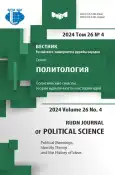Russian Civilizational Identity as the Basis of Value Integrity and State Policy
- Authors: Mchedlova M.M.1,2
-
Affiliations:
- RUDN University
- Federal Center of Theoretical and Applied Sociology of the Russian Academy of Sciences
- Issue: Vol 26, No 4 (2024): Political Meanings, Identity Theory and the History of Ideas
- Pages: 768-785
- Section: IDENTITY AND SOCIO-POLITICAL DIVISIONS
- URL: https://journal-vniispk.ru/2313-1438/article/view/322407
- DOI: https://doi.org/10.22363/2313-1438-2024-26-4-768-785
- EDN: https://elibrary.ru/ZVDQDM
- ID: 322407
Cite item
Full Text
Abstract
The appeal to the civilizational paradigm of the study of the political process makes it possible to incorporate more stable socio-cultural and value foundations into the interpretation of politics. The emphasis on this issue highlights the risks of splits due to hypertrophied inequalities in Russian society, lack of justice, and uneven regional development. The concern is related to the polarization of various segments of Russian society that are irreducible to a single denominator, which raises the question of the similarity or difference of value-normative environments. The consequence is the search for a universal basis for removing intentions to ontologize particulars, one of the effective options for ensuring unity is value integrity. It is the commitment to “one’s own concept of being”, concentrated in value orientations and manifested in behavioral stereotypes, that correlates with the methodological guidelines stated in the article on the socio-cultural legitimization of the independence of the political worldview. It is proposed to consider history, culture, and the state as a common core of values, a semantic node of a common civilizational identity. The central focus of the research methodology is the understanding of civilizational identity as the basis of socio-cultural sovereignty. The commitment of most of the population to preserving their traditional value concepts, their concept of being and worldview, which has been formed over the centuries, supports the stability of civilizational identity. Flowing into the political and instrumental field, this provision becomes the basis of the state policy for the preservation and strengthening of traditional Russian spiritual and moral values Under the pressure of the linear modernization dichotomy traditional/ modern, there is unconditional support for the chosen state strategy for the preservation and promotion of traditional spiritual and moral values, which indicates the unifying and deep nature of the traditional reservoir of values as a semantic core the Russian civilization. The article is based on empirical data obtained during an online survey of students from 6 Federal Districts ( N = 1696).
Keywords
About the authors
Maria M. Mchedlova
RUDN University; Federal Center of Theoretical and Applied Sociology of the Russian Academy of Sciences
Author for correspondence.
Email: mchedlova-mm@rudn.ru
ORCID iD: 0000-0002-4635-1741
Doctor of Political Sciences, Full Professor and Head of the Department of Comparative Politics, RUDN University, Chief Researcher of the Center ‘Religion in Contemporary Society’, Institute of Sociology of the Federal Center of Theoretical and Applied Sociology of the Russian Academy of Sciences
Moscow, Russian FederationReferences
- Braudel, F. (1998). Civilization as a long time extension. In Comparative study of civilizations. A textbook. Moscow: Aspect-Press. (In Russian).
- Braudel, F. (1969). Ecrits sur l’Histoire. Paris.
- Fromm, E. (1997). The anatomy of human destructiveness. Moscow: AST. (In Russian).
- Gorshkov, M.K. (2014). Social inequalities as an object of sociological analysis. Sociological Studies, (7), 20–31. (In Russian).
- Gorshkov, M.K. (2024). Man, society, state: Perspectives of identity. Russia in global affairs, 22(3), 236–241. (In Russian). http://doi.org/10.31278/1810-6439-2024-22-3-236-241.
- Gorshkov, M.K. (Ed.). The “Arrow of time” in the mass consciousness of Russians: Assessments of the past, judgments about the present, ideas about the future. Moscow: Ves Mir. (In Russian).
- Huntington, S., & Harrison, L. (Eds.). (2002). Culture matters. How values contribute to social progress. Anthology. Moscow: Moscow School of Political Studies. (In Russian).
- Mchedlova, M.M. (Ed.). (2024). The Post-Soviet identity of Russia and Armenia: The search for a path to the future. Moscow: RUDN. (In Russian).
- Semenenko, I.S. (Ed.). (2023). Identity: The individual, society, and politics. New outlines of the research field. Moscow: Ves Mir. (In Russian).
- Virillo, P. (1996). The tyranny of the present. Film Art, 1, 130-133. (In Russian).
Supplementary files









